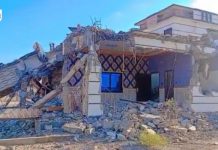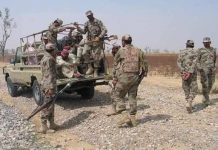Petitioners claim that the government is attempting to suppress political activities by placing activists’ names in the Fourth Schedule.
Individuals added to the Fourth Schedule by the Balochistan government have approached the Balochistan High Court. A bench led by Chief Justice Hashim Kakar has issued notices to the relevant parties. Human rights activist and lawyer Jalila Haider is representing the petitioners in the case.
An application has been filed in the Balochistan High Court on behalf of Abdul Ghaffar Qambrani and his brother Abdul Sattar Qambrani, whose names, along with 130 others from Quetta, have been added to the Fourth Schedule of the Anti-Terrorism Act.
According to the petitioners, the authorities have wrongfully, unlawfully, and maliciously linked them to the Baloch Liberation Army (BLA).
Chief Justice Hashim Khan Kakar and Justice Aamir Rana heard the arguments from the petitioners and accepted the constitutional application, issuing notices to all relevant parties.
During the hearing, lawyer Jalila Haider argued that it is a fundamental right of every citizen to engage in protests while remaining within the democratic framework. She said that the state is attempting to sabotage their peaceful struggle by associating them with banned organizations.
Jalila Haider further stated that the government, through such measures, wants to shut all doors for activists in Quetta and across Balochistan. The court has issued notices to the concerned authorities for the next hearing.
It is important to note that under provincial government orders, the names of nearly four thousand political activists, students, and individuals from various fields across Balochistan have been added to the Exit Control List (ECL) and the Fourth Schedule. These individuals have also been required to appear at the Counter Terrorism Department (CTD) office, and travel restrictions have been imposed on them.
Earlier this month, human rights activist Sammi Deen Baloch, daughter of forcibly disappeared Dr. Deen Muhammad Baloch, was stopped at Karachi Airport by the FIA. The agency stated that the provincial government had imposed a travel ban on her.
Sammi Deen Baloch has filed a petition against her inclusion in the Fourth Schedule and the travel ban in the Sindh High Court, with the hearing scheduled for next week.
What is the Fourth Schedule?
The Fourth Schedule refers to a legal provision under Pakistan’s Anti-Terrorism Act (ATA) of 1997, which allows the government to maintain a list of individuals suspected of involvement in terrorism or activities that pose a threat to public order and security. People whose names are placed in the Fourth Schedule are typically suspected of having links to banned or extremist organizations but have not been formally charged with a crime.
How does the Fourth Schedule work:
- Inclusion of Names:
Authorities, such as law enforcement agencies or counter-terrorism departments, can recommend individuals for inclusion in the Fourth Schedule based on intelligence reports or suspicion of involvement with militant or extremist activities. These individuals are not necessarily proven terrorists but are under surveillance or suspicion.
- Restrictions:
- Individuals listed in the Fourth Schedule face various restrictions, such as travel bans, financial restrictions, and monitoring and reporting.
- It allows authorities to monitor individuals they believe might be involved in illegal activities. However, it can be seen as punitive, as those listed face significant restrictions on their freedom without being proven guilty in court.
- Appeal Process: Individuals can challenge their inclusion in the Fourth Schedule in court, arguing that the government’s decision is unjust or based on incorrect information.
In summary, the Fourth Schedule is a tool used by the government to monitor individuals suspected of posing security threats, but it can also be controversial due to its impact on civil liberties and the lack of formal charges or trials in many cases.






























